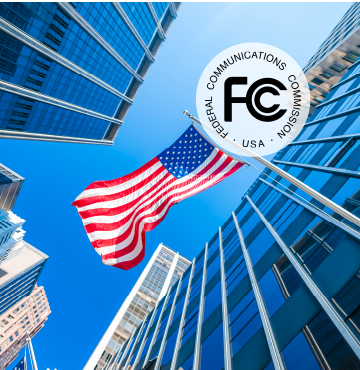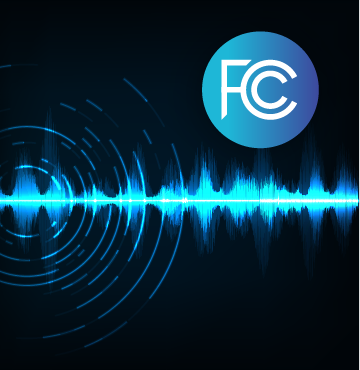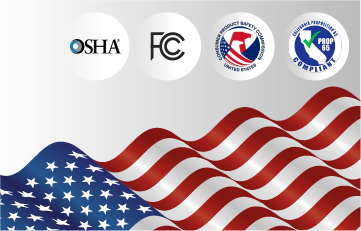Have you ever wondered what ensures clear and reliable communication for public safety services like police radios or commercial two-way radios? The answer lies in FCC Part 90 certification. This regulation ensures that specific radio devices operate within designated frequencies and don’t disrupt critical communication systems. This benefits everyone – manufacturers can confidently bring compliant products to market, distributors can offer peace of mind to their customers, and users experience reliable communication when it matters most.
What is FCC Part 90 Certification?
FCC Part 90 regulations are a set of rules established by the Federal Communications Commission (FCC) to govern the use of radio frequencies in the Private Land Mobile Radio Service. These radios are commonly used by public safety organizations like police, fire departments, and utilities, as well as in commercial applications like taxi fleets and construction sites. This certification is a testament to a device’s compliance with Part 90 regulations, allowing for their lawful sale and operation in the US market.
Why is FCC Part 90 Compliance Important?
There are several key reasons why FCC Part 90 certification is important:
- Prevents Interference: FCC certification helps prevent interference with other radio systems by ensuring devices operate within designated frequencies, guaranteeing clear and reliable communication.
- Public Safety: For critical applications like public safety, uninterrupted communication is essential. Part 90 certification helps ensure radio systems function optimally during emergencies.
- Market Access: If you’re a manufacturer or distributor planning to sell radios in the US that fall under PLMR services, FCC Part 90 certification is mandatory.
What Devices Need FCC Part 90 Certification?
A wide range of radio devices require FCC certification, including:
- Two-way radios (walkie-talkies): Used by public safety, construction, hospitality, and many other industries.
- Land mobile radios: Installed in vehicles for communication on the go.
- Paging devices: Though less common today, some industries still use paging systems.
- Radiolocation devices: These are used for tracking assets or personnel.
Why Choose 360Compliance for FCC Certification?
360Compliance offers unparalleled expertise and comprehensive support throughout the FCC Part 90 testing and certification process. We facilitate every step, from pre-testing consultations to final documentation submission, ensuring your products comply with FCC standards.
- Expert Guidance: Our team of specialists has extensive experience navigating the intricacies of FCC certification.
- Testing and Compliance Assistance: 360Compliance can guide you through testing and ensure your devices meet all FCC requirements.
- Streamlined Process: We can help you complete the application process efficiently, saving you valuable time and resources.
Partner with 360Compliance for smooth FCC Part 90 testing. Contact us today to discuss your specific needs.
Other Certifications

FCC Part 15 Testing
If you're a manufacturer or distributor bringing electronic devices to the U.S. market, understanding FCC Part 15 is crucial. But navigating the intricacies of FCC Part 15 testing can feel overwhelming. This is where 360Compliance comes in as your trusted partner, guiding you through the process with expertise and efficiency. What is FCC Part 15 Testing? FCC Part 15 compliance refers to the section of the FCC rules that specifies the limits of electromagnetic interference allowed from electronic equipment. These regulations ensure that devices such as radios, computers, and any equipment that can emit radio frequency energy do not interfere with wireless communication. Compliance is mandatory for a broad range of electronics, making FCC Part 15 testing an essential part of the manufacturing process. To market electronic products within the U.S., the equipment must not only comply with these regulations but also demonstrate such compliance through testing and documentation. Non-compliance can lead to fines, recalls, and damage to a company's reputation. What Are the Types of Part 15 Devices? Part 15 devices fall into two broad categories: Class A Devices Class A devices are typically industrial or commercial equipment intended for use in business environments. These devices are subject to less stringent emissions limits compared to Class B devices. This devices are expected to be used in environments where there is some level of professional IT staff to manage and mitigate any potential electromagnetic interference. Class B Devices Class B devices are consumer-oriented electronic products intended for use in residential environments. These devices must meet stricter emissions limits compared to Class A devices to ensure they don't cause interference with other electronic devices commonly found in homes, such as TVs, radios, and Wi-Fi routers. What Products Require FCC Part 15 Certification? Any electronic device that emits radio frequency (RF) energy needs to undergo FCC Part 15 testing. This includes: Intentional radiators Wi-Fi and Bluetooth devices Remote controls Radio transmitters Wireless microphones Cellular phones RF identification (RFID) tags Unintentional radiators Computers and their peripherals Switching power supplies LED lights Certain types of electronic equipment like oscilloscopes Home appliances with digital interfaces Some types of industrial machinery How Can 360Compliance Help in the FCC Part 15 Testing Process? 360Compliance provides a streamlined solution to these challenges. With a thorough understanding of FCC Part 15 regulations, we assists manufacturers, distributors, and importers through every step of the certification process. 360Compliance offers end-to-end assistance, including: Preliminary Testing: Conducting initial tests to identify potential compliance issues before formal evaluations. Documentation: Assisting with the compilation of all necessary documentation for FCC submission. Lab Testing: Providing access to certified laboratories for comprehensive FCC Part 15 testing. Guidance: Offering expert advice on how to address any compliance issues that arise during testing. Certification: Assisting with the submission process to the FCC for certification. Why Choose 360Compliance for FCC part 15 Certification? Selecting 360Compliance for FCC testing offers several advantages: Speed to Market: 360Compliance's streamlined process expedites the path from testing to market, ensuring faster product launches. Transparency: Clear communication and a transparent pricing policy remove any unpredictability from the compliance process. Customized Solutions: Services are tailored to meet the specific needs of each client, recognizing the unique challenges different products may face. Expertise and Reliability: A team of experienced professionals ensures that testing and compliance are conducted reliably and in accordance with FCC standards. If you're ready to streamline your FCC Part 15 testing process and ensure your products meet regulatory requirements, contact 360Compliance today for expert assistance.
Learn more
FCC Part 18 Certification
Manufacturers, distributors, and importers of industrial devices in the US must comply with FCC Part 18. This regulation sets limits for radio frequency (RF) energy emitted by intentional radiators used in industrial, scientific, and medical (ISM) applications. Understanding these limits, requirements, and the testing process is crucial to avoid delays, product recalls, and financial penalties. This article provides a clear overview of FCC Part 18 and how 360Compliance can simplify your journey towards achieving FCC compliance testing. What is FCC Part 18? Part 18 encompasses the requirements and limits for ISM equipment to ensure they do not cause harmful interference to radio services. It sets limits on electromagnetic interference (EMI) and requires specific testing procedures. This regulation covers a wide range of devices, including but not limited to, microwave ovens, ultrasonic equipment, and notably, LED lighting. The primary concern of Part 18 is the unintentional emission of radio frequency energy that could disrupt communication systems and other electronic devices. The Importance of FCC Part 18 Compliance Testing Failing to comply with FCC Part 18 regulations can lead to serious consequences, including: Product seizure and fines: The FCC can seize non-compliant devices and fine manufacturers and distributors. Market access delays: Non-compliant equipment may be blocked from entering the U.S. market, causing significant delays and financial losses. Reputational damage: Non-compliance can damage your brand reputation and erode customer trust. Why Choose 360Compliance For FCC Part 18 Testing 360Compliance specializes in simplifying the certification journey for manufacturers, distributors, and importers navigating the complexities of FCC rule Part 18. Our expertise lies in offering end-to-end support throughout the compliance testing and certification process. Expert Guidance: Our team has extensive knowledge of FCC regulations, ensuring accurate assessment of your products against Part 18 requirements. Testing Coordination: We manage the testing process to ensure your devices meet all necessary standards without delay. Documentation Support: We assist in preparing and submitting all required documentation, streamlining the certification process. Customized Solutions: We provide tailored testing plans and strategies to address the specific needs of your device. Global Compliance: Our comprehensive services ensure global regulatory compliance, allowing you to market your products worldwide. Contact 360Compliance today to discuss your specific needs and get started on your FCC compliance journey.
Learn more
FCC TCB Certification
Are you aiming to enter the US telecommunications market but find the FCC TCB certification process overwhelming? Do you need expert guidance to ensure your products meet the stringent FCC standards? 360Compliance can help you navigate the complexities of FCC TCB certification with ease, ensuring your telecommunications equipment complies with all necessary regulations. Let us streamline the process and secure your certification, paving the way for successful market entry. What is a TCB? A Telecommunication Certification Body (TCB) is an organization authorized by the Federal Communications Commission (FCC) to test and certify telecommunications equipment for compliance with technical regulations. These regulations ensure device safety, reliability, and interoperability within the US market. Why is TCB certification important? Obtaining an FCC TCB certificate is crucial for manufacturers seeking to sell their telecommunications equipment in the United States. It demonstrates adherence to FCC standards, safeguarding consumers, and preventing interference with other devices. Why Do You Need TCB Certification? Obtaining a TCB certificate from the FCC is crucial for several reasons: Market Access: A telecommunications certificate is your passport to the US market. Without it, you can't legally sell your equipment. Safety and Reliability: TCB testing ensures your device operates safely and doesn't interfere with other equipment or radio frequencies. Consumer Confidence: A TCB FCC logo on your product signifies adherence to quality and safety standards, boosting consumer trust. Different Options for FCC Authorization of Electrical Products Manufacturers of electrical and electronic equipment that want to sell their products in the United States must make sure that their equipment won't interact with other products or hurt the public. According to Title 47 of the Code of Federal Regulations, the Federal Communications Commission (FCC) oversees and enforces this rule. The FCC ensures that electronic equipment does not interfere with other devices or pose risks to the public. To comply with FCC authorization requirements, products are classified based on intentional or unintentional emission of radio frequency energy. Intentional radiators are devices that must broadcast radio energy as part of their functionality, such as a smartphone. Unintentional radiators are gadgets, such as digital cameras, that can produce radio waves and broadcast them via space or power lines as an unintended side effect of their operation. Class A covers devices primarily used in industrial, commercial, and engineering settings. Class B covers devices that are primarily used in consumer settings. Consumer gadgets are classified as Class B, which has more stringent requirements. Once your product is ready for mass production and consumer supply, the FCC authorization procedure commences. Your device is checked to see if it could cause interference with other devices, transmits in the correct radio frequency band, and complies with other telecommunications standards. The FCC has three options for authorization: Verification Declaration of Conformity Certification (i) Verification This technique is utilized for Part 15 digital devices that either don't have a radio or have one that has been preapproved and is being integrated according to the grant of authorization's standards. The manufacturer or a laboratory can measure the amount of radio frequency energy emitted by these devices. These devices can be advertised and sold without FCC clearance if they are proven to be compliant. A TV receiver is an example of a gadget that may just require authentication. (ii) Declaration of Conformity Devices that fall under Part 18, such as personal computers and their peripherals, are typically subject to more strict regulations. To comply with applicable technical standards, your equipment must undergo measurement of radio frequency energy by a certified laboratory. The FCC logo appears on the label of a conforming product. (iii) Certification FCC accreditation is the most demanding permission. This process applies to equipment that may cause interference with other equipment, signals, or emergency information. Telecommunication Certification Bodies (TCBs), such as Eurofins MET Labs, offer FCC certifications. An FCC ID appears on the label of a compliant product. About FCC and TCB Certification System In the United States of America, the Federal Communications Commission (FCC) governs interstate and international radio, television, wire, satellite, and cable communications (USA). The Federal Communications Commission (FCC) is the major regulator of communications laws, regulations, and technological innovation in the United States, including the Equipment Authorization programmer. Since 2016, the company has held ISO/IEC 17065:2012 accreditation for the FCC's TCB certification system and has been recognized as a Telecommunications Certification Body (TCB) under the EU-USA Mutual Recognition Arrangement (MRA) with the following scope: A1: Low-power transmitters (with the exception of spread spectrum devices), emergency warning systems, unintended radiators (e.g., personal computers and associated peripherals, and TV Interface Devices), and consumer ISM devices subject to certification (e.g., microwave ovens, RF lighting, and other consumer ISM devices) A2: With the exception of spread spectrum devices, low-power transmitters operate on frequencies over 1 GHz. A4: Using spread spectrum techniques, unlicensed National Information Infrastructure (U-NII) devices and low-power transmitters. B1: Parts 20, 22 (cellular), 24, 25, and 27 of the 47 CFR deal with commercial mobile (radio) services. B2: Parts 22 (non-cellular), 73, 74, 90, 95, 96, and 97 of the 47 CFR govern general mobile radio services. Why Choose 360Compliance for FCC TCB Certification? In the competitive landscape of telecommunications, navigating the FCC TCB certification process can be daunting. But with 360Compliance, the process becomes streamlined and efficient. Here's why choosing 360Compliance for your FCC TCB needs is the smart move: Deep understanding of FCC regulations: Our team of experienced professionals has a deep understanding of FCC regulations and the TCB certification process, ensuring your device adheres to the latest requirements. Proven track record of success: With a history of successfully guiding countless clients through the TCB process, 360Compliance has the know-how to navigate any challenges and secure your certification. Global reach: Beyond FCC TCB, 360compliance offers expertise in international certifications like CE marking, opening doors to global markets. Feel free to get in touch with 360Compliance experts to provide you with initial free-of-charge consulting to assist you in defining the right strategic approach with the faster TTM and the most cost-effective solution.
Learn more

